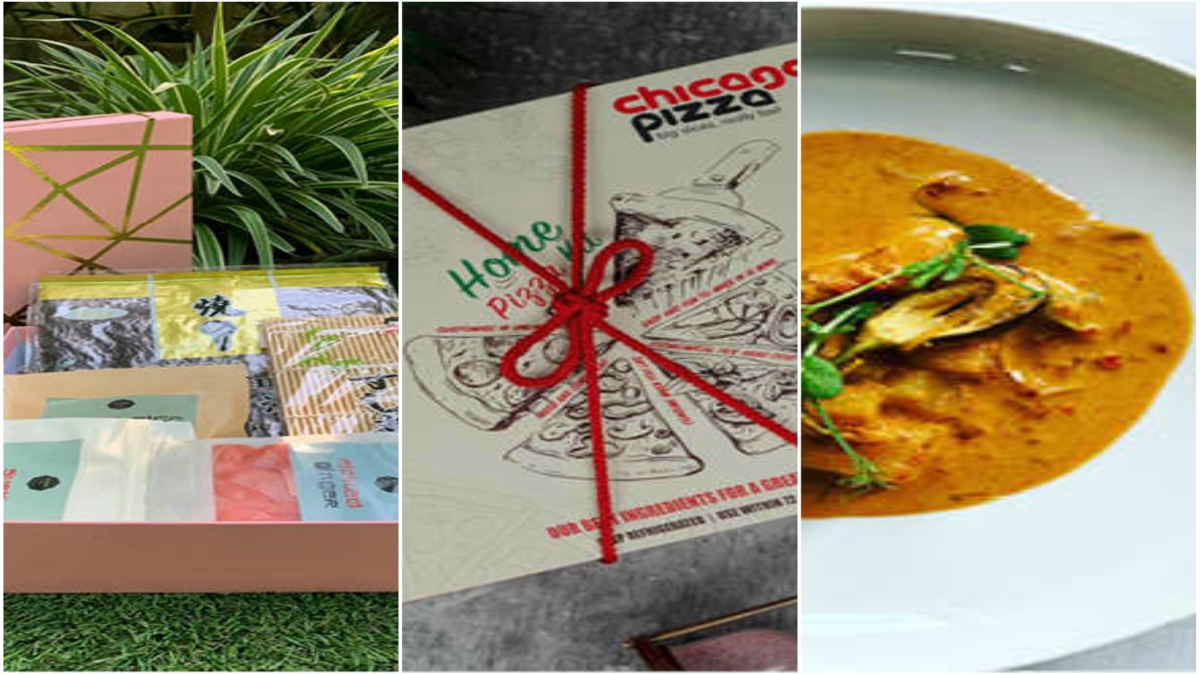A light prawn and barley salad to sneak in for lunch between Zoom calls, a refreshing gin and elderflower cocktail to unwind after a day of struggling with Excel sheets, a slice or two of pepperoni pizza for dinner on the couch, and a sinful piece of hazelnut cake to accompany a late-night Netflix binge. Homemade meals have become a shade more glamorous thanks to the DIY kits which have gained popularity during the pandemic.
“During the lockdown, a lot of people were enjoying cooking at home but also missing their favourite dishes at their favourite restaurants, which is why we introduced our DIY menu,” says Zorawar Kalra of Massive Restaurants, who introduced DIY meal kits in July for signature dishes from his restaurants, like Farzi Café’s Matar Ricotta Bhurjee and Bo Tai’s Smelted Rice Flour Dumplings with Chilli and Sampalok. MD and CEO of First Fiddle F&B, Priyank Sukhija, did the same for his patrons. “With no option to go out and eat, the early days of the lockdown made us realise how much our customers were missing the Asian cuisine at Plum. This demand fuelled us to introduce specialty DIY kits for our scrumptious gyozas and gravies and reach them with wholesome and delicious meals.”
In fact, this demand gave rise to Makery, a Delhi-based meal kit brand launched by Tarika and Rishiv Khattar. Makery has even collaborated with various restaurants, including Indian Accent and Comorin, to provide gourmet meal and cocktail recipes in a DIY format. And home cooks can be guided by the best chefs themselves thanks to video guides which are either part of the parcel or available on the restaurant’s social media accounts. “Our customers can scan the QR codes (available with the kits) and they will be taken to a specific video,” informs Kalra. These videos show each step of the recipes, right up to their plating. “The steps are well explained and all our guests have found them easy to follow,” shares Kalra. The Makery website also hosts recipe videos by top chef Manish Mehrotra. Says co-founder Rishiv, “We are excited to launch a home cooking startup that will make cooking convenient and save the hassle of hunting for the right ingredients.”
Along with the recipe, a DIY kit usually contains specific ingredients, whether raw, semi-cooked or pre-cooked, letting even the most inexperienced of home cooks whip up a restaurant-style meal. Besides the meal being freshly cooked with all its flavours and textures intact – which might not be the case with a home-delivered meal, reminds Sukhija – the ease of access to out-of-reach ingredients is also part of the appeal. “People want restaurant-quality food but don’t really get the ingredients for that in markets around them. Even if they do, it turns out to be expensive because they have to buy whole bottles and packs,” points out Jiten Suchede of Jugmug Thela, who brought out a range of DIY kits including spaghetti meals, complete with measured portions of Grana Padano Italian cheese and Kalamata olives, and chai boxes with jars of their secret chai masala. And it is not only restaurants which grabbed this opportunity. Delhi-based online store Exotic Eats, which specialises in imported ingredients, assembled Thai curry and sushi kits to the delight of people craving South and East Asian treats during quarantine. Owner Gunjan Taneja said that the uncooked ingredients in the kits also have a longer shelf life and can be re-used according to one’s convenience.
“Plus, good hygiene is a concern with foods like sushi and people can be wary of ordering them in now,” says Taneja. Thus, putting together dry ingredients in a kit and letting people cook recipes at home gives them better control over hygiene. Moreover, the in-house packaging and assembly of these kits are letting providers keep a strict check on safety protocols too. “We are using only food-grade packaging material and ensuring minimal human contact during the process,” assures Taneja. Chicago Pizza, which has started delivering customisable DIY pizza kits out of their Saket outlet, is also making sure that the kitchen and packaging areas are regularly sanitised and staff members undergo temperate checks, informs Operations Manager Anurag Rathi.
And these kits are flying off the shelves too. Rathi says that they are selling about 100 kits every day, while Exotic Eats has sold 700 sushi kits since mid-July. Radhika Khandelwal, owner and chef at Fig & Maple says, “The response has been phenomenal and our signatures are the bestsellers. In fact, we started our cocktail kits because our guests insisted on experiencing Fig & Maple at home. Even now, when we are open for dine-in, we are sending out a lot of kits each week.” Whisky Samba is also receiving a great response to their cocktail and mocktail kits. “It is a safer way to drink at home with friends, and the cocktails are also fresher than those made with other packaged premixes. These kits also allow one to show their skills and creativity while bartending at home,” says founder and director Ashish Dev Kapur.
The scope for customisability is also contributing to the popularity of DIY meals. For instance, Chicago Pizza is allowing customers to decide the toppings they want in their kits, while Fig & Maple is creating custom kits for pre-orders. Whisky Samba is also working on ‘skinny’ cocktails with less sugar, based on the feedback they have received, informs Kapur. The fact that health is now a concern for diners everywhere is also evident from the response received by Radhika Gulati of Rosarte Chocolate. “A lot of people were baking during the lockdown, so we decided to create DIY boxes with more nutritional value. Our baking kits are sugarless and consist of almond or hazelnut flours, which we make ourselves, besides almond milk and jaggery,” she says. The benefits of homemade and healthier baked goods are also the reason why Jugmug Thela’s Bread Baker’s Seven kit with five different kinds of seeds has been one of their most popular products during the lockdown.
However, with the festive season upon us, everyone is expecting DIY kits to do even better. “As compared to other ready-to-eat and perishable items, these kits travel well, which make them great for gifting,” says Gulati. In fact, they are already being sent out as gifts by many. “We have received orders for 15-20 kits, with each one going to a different address with personalised notes,” reports Rathi. “We are sending out a bunch of cocktail kits already as presents for birthdays, anniversaries, even baby showers, and now Diwali,” says Khandelwal too. Providers are also revamping their packaging for Diwali and planning more dessert and chocolate kits for Christmas.
So, it is safe to say that DIY kits are not going anywhere soon, even if restaurants have opened and people are letting their guard down about having food delivered. “I think the experience of the family coming together to cook with a kit, getting kids involved, is what makes them special,” says Gulati.













